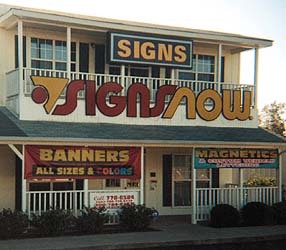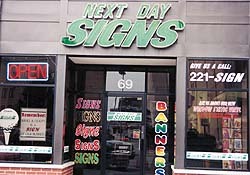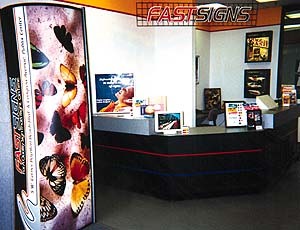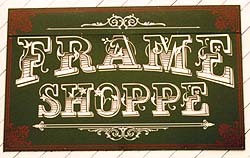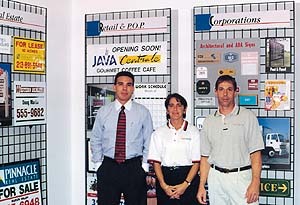Business Management
Shops that Go the Other Way
Stories from sign franchisees
Published
18 years agoon
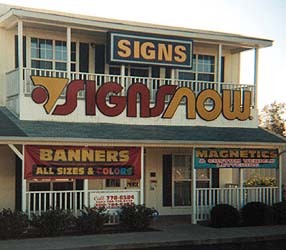
Historically, many traditional commercial signshops have looked down their noses at vinyl franchises. Some sign craftsmen have complained that franchisees lack design acumen; others have claimed that vinyl signage is a poor substitute for good ole’ paint and MDO.
Yet with each passing year, the distinction between traditionalists and franchisees becomes blurred. Thanks to hands-on experience and training, franchisees’ design skills have improved significantly across the board.
Similarly, traditional sign-makers are changing, using vinyl with increasing frequency. Sure, franchisees polled in our January 1998 "Vinyl Usage Survey" used vinyl on 89.8 percent of their signage. But traditional commercial shops weren’t far behind in terms of vinyl usage, incorporating the material into 72.7 percent of their sign work.
It’s not surprising, then, that some commercial signshop owners are making the leap to "the other side," giving up their independent status for the promotional perks and marketing support that franchises afford. Similarly, some companies leave the franchise world of monthly royalty fees to set out on their own.
Here we chronicle some industry "converts." These sign-makers discuss the changes they’ve made to their business since changing their shop’s independent or franchise status, how these changes have affected their shops’ profitability and, in some cases, how these changes have impacted the owners’ personal lives, as well.
Howard Loveless, Signs Now, Cordelia, GA
A journeyman sign-maker with 38 years of experience. An entrepreneur who was named Signs Now’s Franchisor of the Year. A Christian man who credits his business success to God. Indeed, Howard Loveless is a diamond in the world of sign-making — a man with many facets, not to mention many years of experience.
In 1992, Loveless purchased Gailey Signs in Cordelia, GA. He operated the traditional shop alone for two years, until one Saturday in August of 1994 when Loveless was alone in his shop, waiting for a plotter to cut. While waiting, he picked up a packet of Signs Now promotional information that was sent to him the month before. "I’d scanned [the packet] and put it aside previously. Now, I read it carefully," he said. Within 24 hours, Loveless phoned Signs Now Director of Sales Terry Demorest.
The two discussed the possibility of Loveless converting his independent shop to a franchise. Demorest told Loveless that any deal they struck needed to be a "win-win" situation for both parties.
Loveless admits that having to pay a monthly royalty to the franchisor was "a big negative." However, he found many positives with the arrangement: "I liked the idea that [the franchisor] had a dedicated staff there to serve us. And there would be support if I got sick, because other owners could come in and work in my shop." In fact, Loveless says that there’s a real "family kinship" that develops within regional franchise units. The camaraderie among franchisees and their willingness to help one another is "similar to Letterhead friendships," he says.
Joining the Signs Now franchise obviously required that Loveless make some changes to his independent sign business. First, he had to change his mindset. "My mind had to shift from thinking like a craftsman, which I was, to thinking like an entrepreneur, which I should have been," he says.
There were other changes. For example, he had to move operations from a low-visibility, back-street location to a retail storefront. Also, he had to make sure that his new location stayed clean and appealing to customers — something he says many commercial signshop owners fail to do.
Loveless’ shop layout reflects the Signs Now method well: Behind his shop, in a separate building, he has paint facilities. In the shop itself, he has an inviting counter area for order-taking and vinyl sign-making.
Production-wise, Loveless used to make banners using large easels to support the banner material. Now, however, his shop boasts a 4-by-12-foot table with a computer and plotters. This setup means that one person can easily weed and mask a 12-foot piece of vinyl alone.
These days, Loveless is using more pre-coated substrates (banners and otherwise), and few substrates that need to be painted. He says he is phasing out coatings as much as possible for several reasons:
- 1) Doing so eliminates unnecessary production labor.
- 2) He fears EPA and OSHA.
- 3) It minimizes his insurance and workers-compensation costs.
For similar reasons, Loveless is buying more blasted substrate blanks from wholesalers.
"We have more retail-type customers," he says. "People who go out onto the street and buy a sign like they would a suit. Although I still do some painted backgrounds, I only hand-letter once or twice every two or three months. Instead, I use my design ability to do vinyl lettering."
He says his shop’s most dramatic change is yet to come: his sale of digitally printed signage. Signs Now is currently grouping its franchisees into "hub" stores and "spoke" stores. Each hub will have a Xerox electrostatic printer in-house. Each spoke store, then, will purchase graphics from the hub at a very low, wholesale price — like an in-house service bureau.
A final change Loveless has made to his shop has been with regard to customer service. "My business is dedicated to the Lord Jesus Christ," he says. "We do everything with the philosophy ‘What would Jesus do?,’ even if it costs me money. For example, when the enamel on his customer’s sign background failed 2 1/2 years after installation, he met with his customer and agreed to replace the sign at only 50 percent of the actual cost.
His philosophy has also positively impacted the way in which Loveless treats his three full-time employees and his subcontractors. In fact, he has a good relationship with the print shop in a town not far from his own. "I’m his jobber," says Loveless. "He sells a lot of signs for me and has helped my overall volume."
And his volume has steadily risen since becoming a franchisee. The first year after joining Signs Now, his sales volume increased 30 percent. The next year, Loveless experienced yet another 30-percent increase — this, despite a workers-compensation lawsuit at the time. Now, his annual increases in sales are usually 25 percent. In fact, by October 1998, he’d already met and surpassed his 1997 sales.
What advice does Loveless offer to other independents thinking of taking the franchise plunge? "Go to Bradenton, (Signs Now’s headquarters), and actually see corporate. Also, see another shop in operation before you make a decision."
— By Jennifer Flinchpaugh
Ann Harrah, Next Day Signs, Columbus, OH
The other "conversion" case studies in this article focus on independent shops who signed on to a franchise. There are several signshops in Columbus, OH, however, that went the other direction — they left their franchising companies in 1996 to strike out on their own.
Two of these stores, located in Columbus’ northeastern suburbs, are owned by Mike Moody. One of the stores, located downtown, was also once owned by Moody, but was purchased by Ann Harrah in 1997.
According to Harrah, Moody left the franchise with which he was affiliated because he was not pleased with the support he’d received, and because he no longer wanted to pay monthly franchise fees. Like Moody, Harrah appreciates the independence that her shop now has: "Not having to pay royalty fees is a beautiful thing," she says.
Plus, even without a franchise standing behind her shop, Harrah has maintained large corporate accounts. She can do so because she works closely with Moody’s stores and other former franchisees in the Columbus area. Harrah says that essentially, these shops have set up their own cooperative network, sharing Yellow Pages advertising costs and performing wholesale work for one another.
More franchisee stories
Bob Mueller and Jim Dailey, Fastsigns, Boynton Beach, FL
When deciding to open a Fastsigns franchise in Boynton Beach, FL, Bob Mueller and Jim Dailey not only decided on a business change, but a lifestyle change. Both Mueller and Dailey had spent the past 20-odd years working in the pre-press industry, the last eight years of which were spent as co-owners of a digital-service bureau in Minneapolis. But after so many years of dealing with the harsh Minnesota winters and the high cost of running the business, they were ready for a big change. So, the two moved to Boynton Beach to start anew.
Because Mueller and Dailey had started their previous business entirely from scratch, the thought of starting from ground-zero again was less than appealing. So, they picked up the Franchise Times and started researching different franchise opportunities. After toying with several different franchise industries, they settled on the sign industry. Mueller says they chose this industry because, "We wanted to do something totally new, but the risk level can be very prohibitive. So, we figured we could capitalize on the experience we had in the color-separating business in the sign industry."
With a Gerber Scientific Products EDGE

SPONSORED VIDEO
Introducing the Sign Industry Podcast
The Sign Industry Podcast is a platform for every sign person out there — from the old-timers who bent neon and hand-lettered boats to those venturing into new technologies — we want to get their stories out for everyone to hear. Come join us and listen to stories, learn tricks or techniques, and get insights of what’s to come. We are the world’s second oldest profession. The folks who started the world’s oldest profession needed a sign.
You may like

INX Promotes Three to Vice President

6 Sports Venue Signs Deserving a Standing Ovation

Hiring Practices and Roles for Women in Sign Companies
Subscribe

Bulletins
Get the most important news and business ideas from Signs of the Times magazine's news bulletin.
Most Popular
-

 Tip Sheet3 days ago
Tip Sheet3 days agoAlways Brand Yourself and Wear Fewer Hats — Two of April’s Sign Tips
-

 Business Management1 week ago
Business Management1 week agoWhen Should Sign Companies Hire Salespeople or Fire Customers?
-

 Women in Signs2 weeks ago
Women in Signs2 weeks ago2024 Women in Signs Award Winners Excel in Diverse Roles
-

 Real Deal4 days ago
Real Deal4 days agoA Woman Sign Company Owner Confronts a Sexist Wholesaler
-
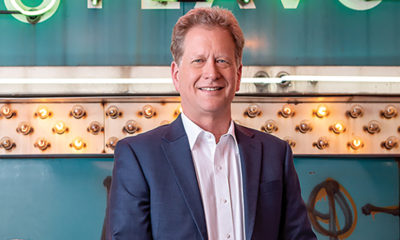
 Editor's Note1 week ago
Editor's Note1 week agoWhy We Still Need the Women in Signs Award
-

 Line Time2 weeks ago
Line Time2 weeks agoOne Less Thing to Do for Sign Customers
-
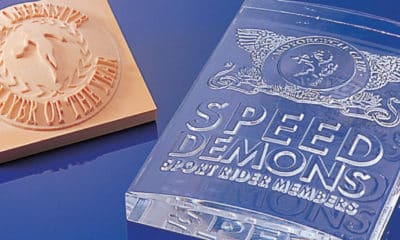
 Product Buying + Technology1 week ago
Product Buying + Technology1 week agoADA Signs and More Uses for Engraving Machines
-
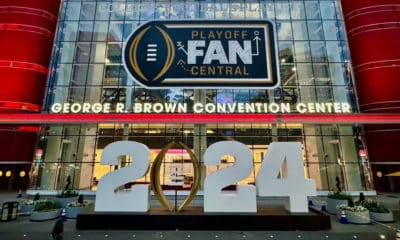
 Benchmarks11 hours ago
Benchmarks11 hours ago6 Sports Venue Signs Deserving a Standing Ovation
